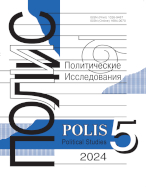Civil society in the countries of the European Union:
ideology, institutions and advance of democracy
Lane D.,
Emeritus Fellow of Emmanuel College, Cambridge University, Fellow of the Academy of Social Sciences, dsl10@cam.ac.uk
Lane D. Civil society in the countries of the European Union: ideology, institutions and advance of democracy. – Polis. Political Studies. 2012. No. 2
The paper examines the significance of “civil society” promotion as a component of the new modes of governance proposed within the EU and its member states. “Civil society” is analysed as a form of political coordination under capitalism; as a reform ideology in the process of opposition under communism; as a policy legitimising democratisation; and as an ideological component of neo-liberalism in the enlargement of the European Union. The paper proposes a model distinguishing the different roles played by ‘civil society’ discourse in the transformation of state socialism.
See also:
Fishman L.G.,
Liberal consensus: the drift from neoliberalism to communitarianism?. – Polis. Political Studies. 2014. No4
Shestopal Ye.B.,
Value Characteristics of the Russian Political Process and Strategy of the Country’s Development. – Polis. Political Studies. 2014. No2
Kholodkovskii K.G.,
Access to information as democratic institution. – Polis. Political Studies. 2010. No5
Krasin Yu.A.,
The state and the society: shifts in the power field. – Polis. Political Studies. 2013. No5
Yazhborovskaya I.S.,
Fourth wave of the world process of democratization and the development of civil society in Central-East and South-East Europe. – Polis. Political Studies. 2013. No5





.jpg)






 print
print
.jpg)
.jpg)